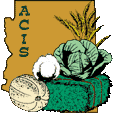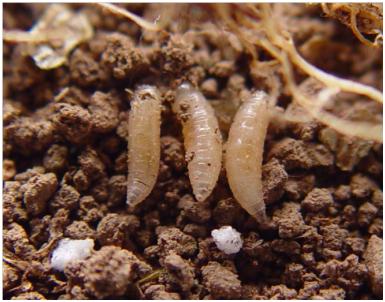 |
|
|
|

|
|||
| |
|||
In my last update I talked about my inability to accurately predict insect outbreaks relative to weather conditions. However, in some cases, the probability of certain insects occurring when environmental conditions and management practices are favorable can be quite high. The seedcorn maggot (SCM) on spring melons crops is a good example of this. SCM can significant stand reductions in spring melons and other large seeded crops due to larvae feeding on germinating seed, roots and even stems. If SCM populations are high, replanting parts or all of an infested field is often necessary. Not only is this an inconvenience to the grower, but replanting is expensive and can disrupt harvest schedules. Unfortunately, once maggots have been found infesting the soil during stand establishment, there is usually nothing you can do. Thus, avoidance of the problem is the most effective way of preventing stand reductions (read "Seed corn maggot 2013"). First, weather plays a major role in determining the damage potential for SCM to be a problem. Melon stands are more susceptible to SCM during wet, cool spring weather in which seed germination is slowed or delayed. These conditions give SCM a chance to develop in the soil and attack the seeds before they can emerge. Secondly, our cropping system plays a key role. Melon crops following produce are the most often attacked because SCM are attracted to fields with high levels of decomposing organic matter. This includes heavy plant residue remaining after harvest of the previous lettuce or cole crop, as well as applications of manure prior to planting. Growers would be encouraged not to plant melons into fields under these conditions. However if growers decide to plant in these conditions, then it would be wise to use a preventative insecticide applied at planting to minimize the impact from SCM and give seedling stands a fighting chance. A few alternatives are available that have shown activity against SCM and may be practical for SCM management in spring melons, read more about it in: SCM Control on Cantaloupes 2012.
Remember: When in Doubt-Scout. Click picture to listen to John To contact John Palumbo go to: jpalumbo@ag.arizona.edu
|
|||
| Back | |||
For questions or comments on any of the topics please contact Marco Pena at the Yuma Agricultural Center. |
|||
| Home | Cotton
| Veggies | Forages
| Grains | Citrus
| Crop x Crop Insects | Diseases| Weeds | Pesticides | Economics | News | Weather | Research | Photos | Contacts | General Info. Copyright © 2001 University of Arizona, College of Agriculture and Life Sciences Webmaster: Al Fournier (acis@ag.arizona.edu) |
|||

